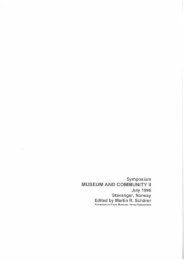Key Concepts of Museology - ICOM
Key Concepts of Museology - ICOM
Key Concepts of Museology - ICOM
Create successful ePaper yourself
Turn your PDF publications into a flip-book with our unique Google optimized e-Paper software.
I NTRODUCTION<br />
18<br />
Running a Museum: A Practical Handbook 1 ), while they are much rarer<br />
in France or in the old eastern European countries, which favour essay<br />
writing and developing thought and theory.<br />
It would nevertheless be too caricatural to divide museum<br />
literature into a practical component, strictly Anglo-American, and a<br />
theoretical component, closer to the Latin way <strong>of</strong> thinking: the number<br />
<strong>of</strong> theoretical essays written by Anglo-Saxon thinkers in museum<br />
literature completely contradicts this picture. The fact remains that<br />
a number <strong>of</strong> differences exist, and differences are always enriching to<br />
learn and to appreciate. We have tried to take this into consideration.<br />
Finally it is important to pay tribute, through the choice <strong>of</strong> the<br />
French language, to the fundamental theoretical work continued for<br />
many years by the fi rst two directors <strong>of</strong> <strong>ICOM</strong>, Georges Henri Rivière<br />
and Hugues de Varine, without whom a large part <strong>of</strong> the museum<br />
work in continental Europe and in the Americas and Africa could not<br />
be understood. A fundamental refl ection on the museum world cannot<br />
overlook its history, just as it must keep in mind that its origins were<br />
anchored in the Enlightenment and that its transformation (that is its<br />
institutionalisation) occurred at the time <strong>of</strong> the French Revolution, but<br />
also that the theoretical foundations were laid on the other side <strong>of</strong> the<br />
Berlin wall during the 1960s when the world was still divided into two<br />
antagonistic blocs. Although the geopolitical order was completely<br />
overturned nearly a quarter <strong>of</strong> a century ago, it is important that<br />
the museum sector should not forget its own history – this would be<br />
absurd for an instrument that passes culture on to the public and to<br />
future generations! However, there is still a risk <strong>of</strong> a very short memory<br />
which retains from museum history only how to run such institutions<br />
and how to attract visitors…<br />
A constantly evolving structure<br />
Right from the start it was not the authors’ aim to write a ‘defi nitive’<br />
treatise about the museum world, an ideal theoretical system cut <strong>of</strong>f<br />
1. BOYLAN P. (coord.), Running a Museum: A Practical Handbook, Paris, <strong>ICOM</strong>/Unesco, 2004.<br />
http//:unesdoc.unesco.org/images/0014/001410/141067e.pdf (accessed: June 2010).
















